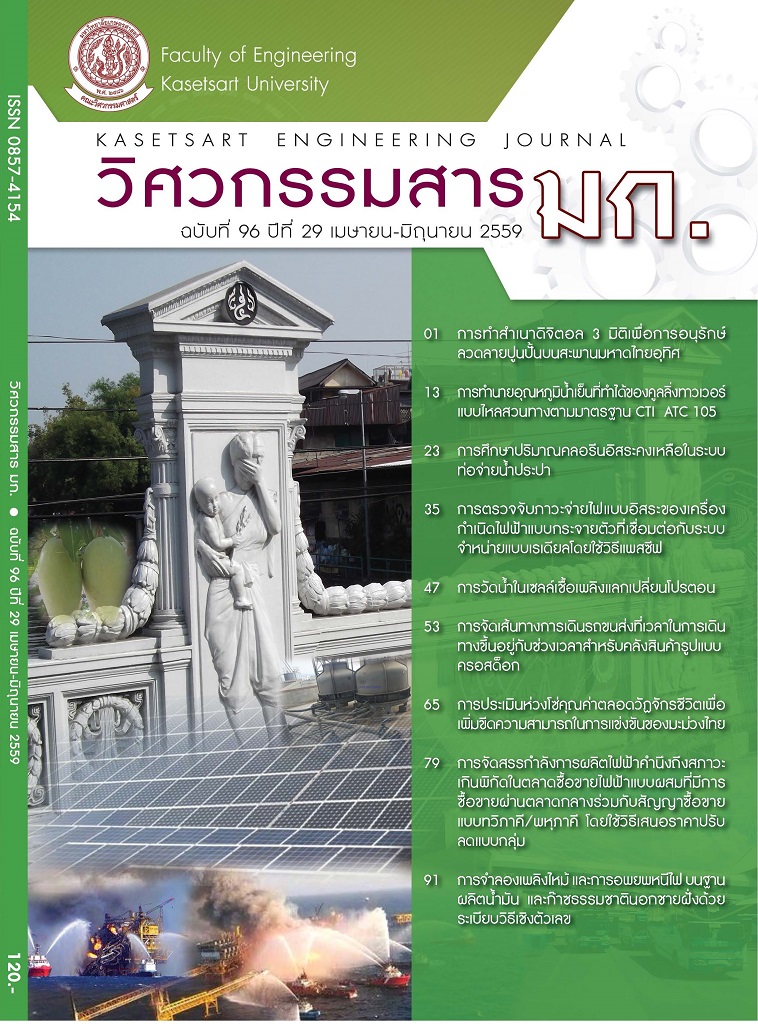การจัดสรรกำลังการผลิตไฟฟ้าคำนึงถึงสภาวะเกินพิกัดในตลาดซื้อขายไฟฟ้าแบบผสมที่มีการซื้อขายผ่านตลาดกลางร่วมกับสัญญาซื้อขายแบบทวิภาคี/พหุภาคี โดยใช้วิธีเสนอราคาปรับลดแบบกลุ่ม
Keywords:
สภาวะเกินพิกัดของสายส่ง, ตลาดซื้อขายไฟฟ้า, การทำธุรกิจไฟฟ้าแบบทวิภาคี/พหุภาคี, ราคาปรับลดแบบกลุ่ม, การไหลของกำลังไฟฟ้าที่ดีที่สุด, transmission congestion, electricity markets, bilateral/multilateral contracts, group curtailment Bids, optimal power flowAbstract
บทความนี้นำเสนอวิธีการหาคำตอบของปัญหาสภาวะเกินพิกัดที่เกิดขึ้นในระบบซื้อขายไฟฟ้าแบบเสรีของการทำธุรกิจไฟฟ้าแบบทวิภาคี/พหุภาคี ในตลาดการซื้อขายไฟฟ้าซึ่งการศึกษาการทำธุรกิจไฟฟ้าแบบทวิภาคีแบ่งออกเป็น 2 รูปแบบ คือ สัญญาการซื้อขายไฟฟ้าทวิภาคีแบบมั่นคงและสัญญาซื้อขายไฟฟ้าทวิภาคีแบบไม่มั่นคง โดยใช้หลักการไหลของกำลังไฟฟ้าที่ดีที่สุดมาช่วยในการคำนวณ ซึ่งหากระบบไม่สามารถรองรับการส่งผ่านกำลังไฟฟ้าหรือระบบเกิดสภาวะเกินพิกัด อันเนื่องมาจากเกิดการติดขัดของสายส่ง จนไม่สามารถส่งกำลังไฟฟ้าได้ตามสัญญาซื้อขายไฟฟ้าแบบทวิภาคี/พหุภาคี ดังนั้นศูนย์ควบคุมไฟฟ้าอิสระจะต้องใช้วิธีเสนอราคาปรับลดแบบกลุ่ม สำหรับสัญญาซื้อขายไฟฟ้าแบบพหุภาคี เพื่อแก้ไขปัญหาการเกิดสภาวะเกินพิกัดของระบบ ซึ่งผู้ซื้อขายไฟฟ้าพหุภาคีต้องเสนอราคาที่สูงเพื่อแข่งขันกับผู้ซื้อขายไฟฟ้าทวิภาคีแบบมั่นคง เพื่อไม่ให้ถูกปรับลดสัญญาซื้อขายไฟฟ้า และถ้าผู้ซื้อขายไฟฟ้าพหุภาคีถูกปรับลดสัญญา ซึ่งส่งผลให้ปริมาณกำลังไฟฟ้าลดลงจากสัญญาที่ได้ตกลงไว้ ผู้ซื้อขายไฟฟ้าพหุภาคีจำเป็นต้องซื้อขายไฟฟ้าในตลาดซื้อขายไฟฟ้า เพื่อรักษาระดับปริมาณกำลังไฟฟ้าให้เพียงพอกับความต้องการ โดยที่โหลดรวม ณ บัสใดๆ จะมีค่าคงที่และไม่มีการตัดโหลด
Power Generation Allocation Considering System Congestion in Mixed Electricity Markets with Pool and Bilateral/Multilateral Contracts using Group Curtailment Bids
This paper proposes the study of congestion management in energy transactions with bilateral and multilateral contracts in electricity market. The bilateral transactions include the firm bilateral and nonfirm bilateral contracts. The study applies the concept of optimal power flow in order to optimally dispatch power generations. When there are transmission congestions in the system resulting in the shortage of power generation in bilateral or multilateral contracts, the independent system operator (ISO) uses the non-curtailment bids for bilateral contracts and group curtailment bids for multilateral contracts to curtail the contract. The participants in multilateral contracts must offer higher bids than the participants in the firm bilateral contracts in order to receive the full amount of power generation on the contract. If the contract is curtailed, the shortage power generation is compensated by the purchase from the pool. Therefore the demand at each and every bus in the system is satisfied without being shed.


